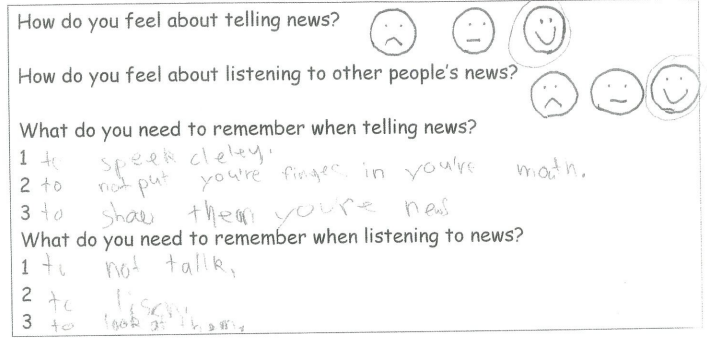Teachers PD - developing teacher agency - effective pedagogy
Thursday, 21 March 2013
Assessment
The Assessment Cycle - showing Assessment for learning (formative), Assessment of learning (summative), Diagnostic Assessment (for planning), and Assessment as learning (students involved)
Using Portfolios for Assessment
Portfolios - year-long or term-long collections of student work can be used in different ways, and can be done well or poorly - the aim is to reflect a curriculum standard or criterion:
Wednesday, 20 March 2013
Making Group work work
Group work does not equal cooperative learning, it has to be structured effectively by the teacher!
1. Teacher determine groups, don't let the students choose.
2. "Ask 3 before me" (the teacher is not the only one who can help).
1. Teacher determine groups, don't let the students choose.
2. "Ask 3 before me" (the teacher is not the only one who can help).
Restorative Practice
RESTORATIVE PRACTICE KEY QUESTIONS
- What happened?
- What do you think about what happened?
- What might someone else think about what happened?
- Who has been affected by what happened?
- In what way?
- What do you think has to happen next to make things better?
Sunday, 17 March 2013
Habits of Mind
I got this from http://ultranet.csn.school.nz/WebSpace/1720/ they give this accompanying good advice:
DEVELOPING THE HABITS
OF MIND AT HOME
- Choose
one or two Habits of Mind to focus on. Spend time family-watching and
kid-watching, paying attention to daily interactions, dinner conversation,
home learning time, how your children resolve conflicts etc. Think
about the things you would like to change and choose the Habits of Mind
that might help.
- Tell
your children about a time that you used the Habit of Mind at work -
explain how it helped you to be an effective and creative problem solver.
- Have
a family story time. Read a book that illustrates the Habit of Mind your
family is working on.
- When
assisting your child with a project or home learning - start out by
discussing which Habits of Mind will help to achieve doing this project
thoughtfully, effectively, creatively and efficiently.
- Talk
about times that you weren't successful and how a particular Habit of Mind
would have helped turn the experience into a successful one.
- Comment
when your child uses the Habits of Mind. For example, “I like the
way you have been persisting with those math problems” or “When I was
speaking with you, you were listening very thoughtfully to what I had to
say.”
- Cut
cartoons out that illustrate characters that use a Habit of Mind.
- Point
out examples of Habits of Mind in books, a television program, in the news
or in a movie.
- When
reviewing home learning or school learning that has been completed,
discuss what Habits of Mind helped to complete the task/activity.
- Discuss
your child's learning goals in relation to the Habits of Mind. What
Habits will help your child achieve their learning goals and how?
- Be a
role model. Lead by example.
Thursday, 14 March 2013
For full reading, about learning intentions and success criteria, which is excellent, see shared google docs or click link: https://docs.google.com/file/d/0B84bj2K5Y_JJZ3NtSHRuLVUzaFE/edit
Tuesday, 12 March 2013
Monday, 11 March 2013
Tuesday, 5 March 2013
Saturday, 2 March 2013
Subscribe to:
Comments (Atom)














